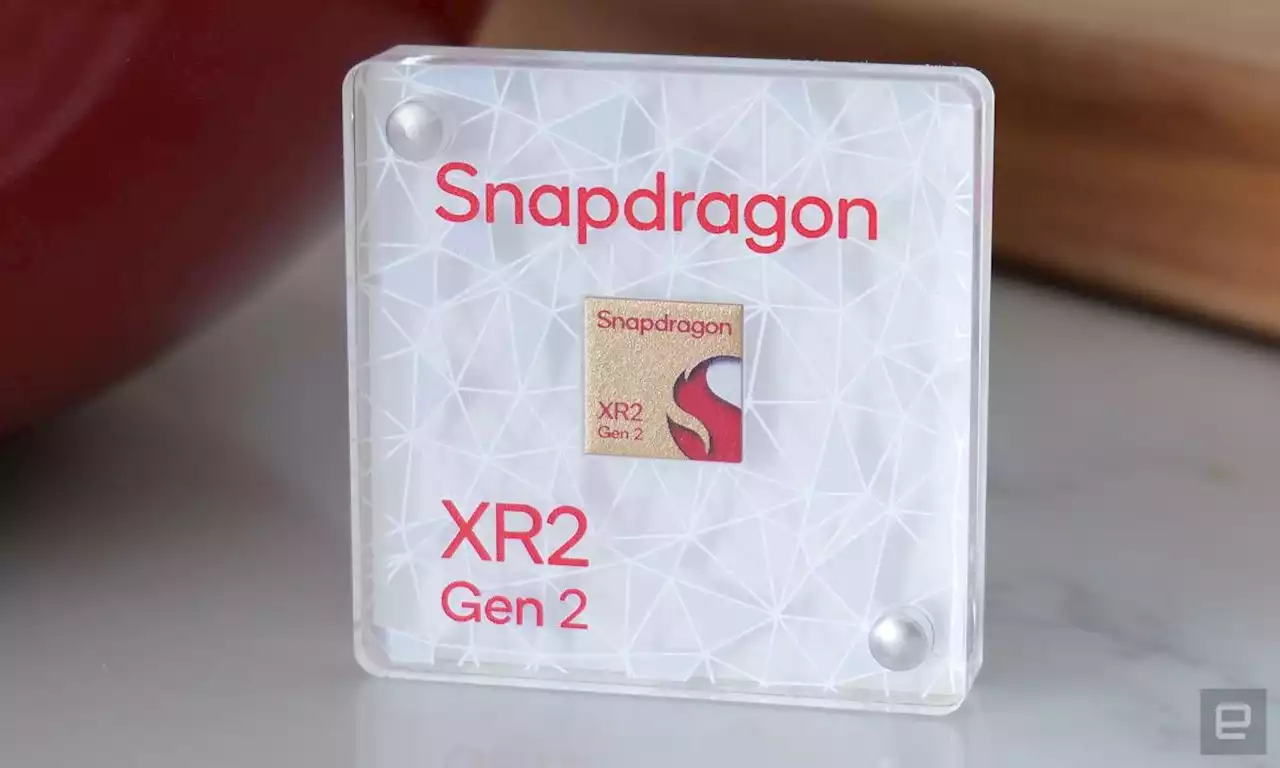Making their debut in the Meta Quest 3 and Ray-Ban Meta smart glasses, today Qualcomm announced two new Snapdragon chips designed to power next-gen AR and MR devices.
Developed in collaboration with Meta, on Wednesday Qualcomm announced two new Snapdragon chips designed to power the upcoming wave of next-gen headsets and smart glasses.
The Snapdragon XR2 Gen 2 is the more powerful of the two boasting 2.5 times better GPU performance compared to the last generation and up to eight times faster AI speeds. It's optimized to support mixed reality devices with display resolutions of up to 3,000 x 3,000 per eye while also delivering more detailed textures and higher frame rates.
For headsets that can switch between VR and AR, Qualcomm says the XR2 Gen 2 allows headsets to transition to full-color passthrough vision in less than 12ms. Other capabilities include support for devices with up to 10 cameras, improved wireless speeds and 50 percent increased GPU power efficiency. Alternatively, for more lightweight devices like smartglasses, Qualcomm's Snapdragon AR1 Gen 1 chip offers improved on-device AI processing, better noise and echo cancellation and dual ISPs for improved image quality. The new silicon can also support devices with up to 12-MP cameras and up to eight microphones with spatial sound for richer audio recording.
Notably, due to its collaboration with Meta, Qualcomm's latest XR and AR processors will be available first on the new
Malaysia Latest News, Malaysia Headlines
Similar News:You can also read news stories similar to this one that we have collected from other news sources.
 Meet the Qualcomm chips powering Meta's Quest 3 headsetQualcomm's Snapdragon XR2 Gen 2 and Snapdragon AR1 Gen 1 bring game-changing performance, efficiency, and connectivity to VR headsets and AR glasses.
Meet the Qualcomm chips powering Meta's Quest 3 headsetQualcomm's Snapdragon XR2 Gen 2 and Snapdragon AR1 Gen 1 bring game-changing performance, efficiency, and connectivity to VR headsets and AR glasses.
Read more »
 Meta AI: it’s ChatGPT for all your Meta apps.You can talk to it directly, or bring it into any chat you’re having on Instagram or Messenger or WhatsApp. This seems to be Meta’s all-purpose AI assistant, its answer to Bard and Bing and ChatGPT. But nobody can touch Meta’s ability to get this thing in front of a lot of people really fast. Don’t miss Alex Heath’s deep dive on all of Meta’s big chatbot plans, which are remarkably ambitious.
Meta AI: it’s ChatGPT for all your Meta apps.You can talk to it directly, or bring it into any chat you’re having on Instagram or Messenger or WhatsApp. This seems to be Meta’s all-purpose AI assistant, its answer to Bard and Bing and ChatGPT. But nobody can touch Meta’s ability to get this thing in front of a lot of people really fast. Don’t miss Alex Heath’s deep dive on all of Meta’s big chatbot plans, which are remarkably ambitious.
Read more »
 The Strategic Benefits of Randomized Decision-MakingIn highly ambiguous and challenging contexts, a random approach to decision-making confers a number of advantages. Operations managers have been using randomized decision-making since World War II (randomized search was used to locate enemy submarines in the open ocean), but it has not yet been seriously applied to strategic decision-making, which remains focused on hypothesis formulation and testing. In this article the authors explain the strategic benefits of randomized decision making — early advantage, faster learning, less predictability, and reduced biases — and offer advice on how to incorporate randomness in the strategy-making process.
The Strategic Benefits of Randomized Decision-MakingIn highly ambiguous and challenging contexts, a random approach to decision-making confers a number of advantages. Operations managers have been using randomized decision-making since World War II (randomized search was used to locate enemy submarines in the open ocean), but it has not yet been seriously applied to strategic decision-making, which remains focused on hypothesis formulation and testing. In this article the authors explain the strategic benefits of randomized decision making — early advantage, faster learning, less predictability, and reduced biases — and offer advice on how to incorporate randomness in the strategy-making process.
Read more »
 Qualcomm Powers Next-Gen Spatial Computing With XR2 Gen 2 And AR1 Gen 1 PlatformsTPrincipal Analyst, Mobility & VR, Anshel Sag, shares his thoughts on Qualcomm's XR Gen 2 and AR Gen 1 platforms
Qualcomm Powers Next-Gen Spatial Computing With XR2 Gen 2 And AR1 Gen 1 PlatformsTPrincipal Analyst, Mobility & VR, Anshel Sag, shares his thoughts on Qualcomm's XR Gen 2 and AR Gen 1 platforms
Read more »
 Ray-Ban Meta smart glasses hands-on: Techy sunglasses you might actually want to wearOn Wednesday at its annual Connect event, Meta announced its second-gen smart glasses which feature some major hardware upgrades and a wider range of colors and frames.
Ray-Ban Meta smart glasses hands-on: Techy sunglasses you might actually want to wearOn Wednesday at its annual Connect event, Meta announced its second-gen smart glasses which feature some major hardware upgrades and a wider range of colors and frames.
Read more »
